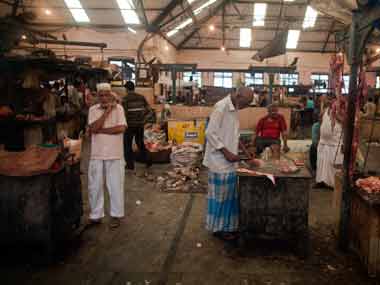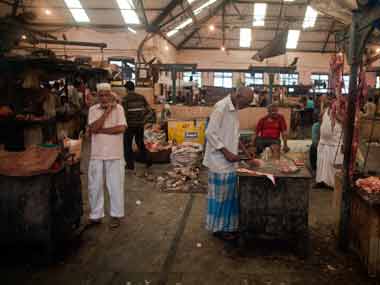Srinagar: Just two days after Kashmir shutdown to protest callous approach of the state government towards rehabilitating flood victims, the valley is on the boil again. This time it is the Jammu and Kashmir High Court’s decision on Wednesday to enforce a statewide ban on the sale of beef.[caption id=“attachment_2240846” align=“alignleft” width=“380”]  Representational image. Reuters[/caption] In 2014, Parimoksh Seth, an advocate in Jammu, had filed a Public Interest Litigation (PIL) against cow slaughter in the state. It had said the slaughtering or killing of bovine animals was an offence punishable under Section 298-A and possession of such slaughtered animal an act punishable under Section 298-B of the RPC. The courts decision has put the majority Muslim population, separatist leaders, religious organisations and even mainstream political parties at loggerheads with the PDP-BJP coalition government. The state wide ban is seen as an infringement into “religious matters”. The situation, it seems, is brimming to go out of control. Seth, now deputy advocate general of the state government in Jammu High Court, says slaughtering of cows in the state was not only against the law but it severally affected religious sentiments of a section of the society. But he also said he was removing his name from the plea as he holds a public office now. When the state government failed to file an appropriate response regarding the smuggling and slaughtering of bovine animals, a division comprising of justice Dhiraj Singh Thakur and justice Janak Raj Kotwal directed DGP Jammu and Kashmir to ensure that appropriate directions were given to all SSPs, SPs and SHOs of all districts and police stations in Jammu and Kashmir that there shall be no sale of beef across the state. The court’s decision came just two weeks ahead of the Muslim festival of Eid. Interestingly, while the people in Jammu are celebrating the verdict, in Kashmir people have taken to the streets. On Friday, six people were injured in clashes with security forces in South Kashmir’s Pulwama district. They were protesting against the court order. In Srinagar, sources said more than two dozen cows were slaughtered as a sign of defiance against the court order. Kashmir remained shut on Saturday following a strike call given by Hurriyat leaders both moderate and hawks, and almost every other section of the society. Even some sections of the ruling Peoples Democratic Party supported the strike. Peoples Democratic Party youth president and political analyst in Chief Minister’s Office, Waheed-Ur-Rehman Para said people should be the best judges to decide what to eat and what not to. “Let people decide what they want to eat and what they dislike. We don’t need law enforcing agencies to tell us what we should eat in our dinner,” Para said. The decision has not only irritated religious organisations and majority of the Muslim population but even provided separatists with more reasons to train guns against the coalition government. Democratic Freedom Party (DFP) chairperson, Shabir Ahmad Shah, said the court judgment banning the sale of beef is unacceptable. “This order is unacceptable and aimed at hurting the sentiments of Muslims. We strongly condemn such interference in religious affairs by judiciary,” Shah said. The state government has so far maintained its silence on the issue. Valley-based political party Jamat-e-Islami on Thursday threatened to launch an agitation against the ban. “Even if such bill is passed by the state assembly and ratified by Indian Parliament no law can come between us and the Sharia law,” said GM Bhat, the party’s newly elected chief. Separatists on the other hand launched a scathing attack on the government alleging direct interference in the ‘religious affairs’ and ‘programme to create communal tensions’. In the 80s, a Hindu groups had demanded ban on the sale of beef after which the then governor Jagmohan tried implementing the ban, which however backfired. It brought, Qazi Nisar, a little known clerk in south Kashmir to the centre stage of politics in Kashmir, after he slaughtered a cow in the main Chowk in Anantnag. Later he become one of the founders of the Muslim United Front (MUF), an amalgamation of religious parties which took on the Congress-National Conference coalition in the 1987 elections that was rigged. Hizbul Mujahideen chief Mohammad Yousuf Shah alias Syed Salahuddin too was a member of MUF and had fought election too. Constitutional expert, Zaffar Ahmad Shah, says the government can revoke the ban by scraping of Article 298 of Ranbir Penal Code (RPC). Revoking Article 298 of RPC will render the ban null and void. It is highly unlikely the court orders will have an impact on the beef sale in Kashmir valley but it unintentionally would further the divide between Hindu Jammu and Muslim Kashmir.
The decision has not only irritated religious organisations and majority of the Muslim population but even provided separatists with more reasons to train guns against the coalition government.
Advertisement
End of Article


)

)
)
)
)
)
)
)
)



